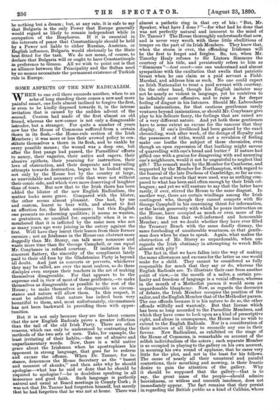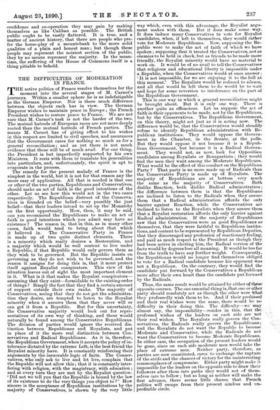SOME ASPECTS OF THE NEW RADICALISM.
WHEN to one evil there succeeds another, when to an ache of long standing there comes a new and more painful smart, one feels almost inclined to forgive the first, or even to be kindly disposed towards it, in the intense irritation that is caused by the sudden advent of the second. Custom had made of the first almost an old friend, whereas the new-comer is not only a disagreeable intruder, but a stranger. For quite a number of years now has the House of Commons suffered from a certain thorn in its flesh,—the Home-rule section of the Irish Members ; it was more or less their avowed policy to con- stitute themselves a thorn in its flesh, and to rankle by every possible means ; the wound was a deep one, but after the first pangs had passed, the Parnellites' efforts to annoy, their vagaries, their antics and capers, their abusive epithets, their yearning for instruction, their love of obstruction, and their desperate and unavailing attempts towards destruction, began to be looked upon, mot only by the House but by the country at large, as unavoidable and necessary evils that were not without their comic side, and which were more deserving of laughter -than of tears. But now that to the Irish thorn has been added the blister of the new English Radicalism,, the matter looks more grave. Compared with the blister, 'the other seems almost pleasant. One had, by use and custom, learnt to bear with, and almost to feel • an affection for, the Irish nuisance; but this English one presents no redeeming qualities ; it seems so wanton, so gratuitous, so uncalled for, especially when it is re- membered that it is inflicted by the same men who not so many years ago were joining in the outcry against the first. Well have they learnt their lesson from their former enemies ; not an Irishman in the House can obstruct more doggedly than Mr. Storey, can talk more nonsense and waste more time than Sir George Campbell, or can equal Mr. Conybeare in refined courtesy. If imitation is the • sincerest flattery, the sincerity of the compliment lately paid to their old foes by the Gladstonian Party is beyond all doubt. And just as converts or perverts, whichever they may be called, are ever the most zealous, so do these disciples even surpass their teachers in the art of making themselves disagreeable. For that appears to be the supreme end in view of most of these gentlemen,—to make themselves as disagreeable as possible to the rest of the House ; to make themselves as disagreeable as circum- stance and nature will allow them. In this respect, it must be admitted that nature has indeed been very bountiful to them, and, most unfortunately, circumstance has not been backward in providing them with oppor- tunities.
But it is not only because they' are the latest comers that the new English Radicals prove a greater infliction than the tail of the old Irish Party. There are other reasons, which can only be understood by contrasting the methods of the two sets of men. Take, for example, the least irritating of their habits,—the use of abusive and • unparliamentary words. Now, there is a wild native grace about the Irishman when he apostrophises his opponent in strong language, that goes far to redeem and, excuse the offence. When Dr. Tanner, for in- stance, denounces the Home Secretary as the "basest and meanest of skunks," and then asks why he should .apologise—what has he said or done that he should be required to apologise ?—he is doubtless speaking in all innocence and good faith. Such language is perfectly natural and usual at Board meetings in County Cork ; it was not that Dr. Tanner had forgotten himself, but merely that he had forgotten that he was not at home. There was almost a pathetic ring in that cry of his : "But, Mr. Speaker, what have I done ? "—for what had he done that was not perfectly natural and innocent to the mind of Dr. Tanner ? The House thoroughly understands that now, and is never very wroth with these little ebullitions of temper on the part of its Irish Members. They blow that, when the storm is over, the offending Irishman will be the first to forget and forgive. So, too, when Mr. Timothy Healy refuses to Sir Linton Simmons the courtesy of his title, and persistently refers to him as "Simmons "—tout court—one can understand and almost sympathise with the exultation that swells that patriotic breast when he can claim as a paid servant a Field- Marshal, and address him as such. No one could expect an Irish Nationalist to treat a paid servant with courtesy. On the other hand, though his English imitator may not be nearly so violent in language, yet he contrives to be infinitely more offensive, and to raise a far deeper feeling of disgust in his listeners. Should Mr. Labouchere make insinuations, for that cautious gentleman rarely ventures beyond insinuations, or should Mr. Conybeare give play to his delicate fancy, the feelings that are raised are of a very different nature. And yet both these gentlemen have to some extent an excuse for the rancour that they display. If one's livelihood had been gained by the exact chronicling, week after week, of the doings of Royalty and the possessors of titles, would not a revulsion of feeling make one loathe the subject of these chronicles, even though an open expression of that loathing might savour of quarrelling with one's bread and butter ? If nature had gifted one with a genius for disagreeing with and annoying one's neighbours, would it not be ungrateful to neglect that gift ? The remark made by the Member for Cambonae, and supported by the Member for Northampton, with regard to the funeral of the late Duchess of Cambridge, so far as con- cerns the actual words that were used, was as nothing com- pared to what has been said often enough by their Irish col- leagues ; and yet we will venture to say that the latter have rarely, if ever, stirred the House to the same disgust. In another way, there are certain windbags among the Irish contingent who, though they cannot compete with Sir George Campbell in his consuming thirst for information, or the lavish generosity with which he pours instruction on the House, have occupied as much or even more of the public time than that well-informed and honourable Member; and yet we doubt whether they have ever filled the Treasury Bench with the same deadly dismay, the same foreboding of unutterable weariness, as that gentle- man does when he rises to speak. Again, what makes the obstruction of Mr. Storey so unpardonable, when one regards the Irish obstinacy in attempting to wreck Bills almost with pity ?
The fact is, that we have fallen into the way of making the same allowances and excuses for the latter as one would make for a child. They cannot be considered as fully responsible for much that they say or do, whereas the English Radicals are. To illustrate their case from another point of view,—in the mouth of a sailor, a certain pro- fanity and freedom of language is a venial offence, whereas in the mouth of a Methodist parson it would seem an unpardonable blasphemy. Now, as regards the decencies of debate, the Irish Member occupies the position of the sailor, and the English Member that of the Methodist parson. The one offends because it is his nature to do so, the other offends wilfully and wantonly. But that license which has been so long accorded to the Pamellite Members, and which they have come to look upon as a kind of prescriptive right, and abuse in consequence, the House has no wish to extend to the English Radicals. Nor is a consideration of their motives at all likely to reconcile any one in their favour. New Radicalism, as exhibited on the stage of the House of Commons, is remarkable on account of the selfish individualism of the actors ; each separate Member is so occupied in playing to the gallery on his own account, in securing his own round of applause, that he cares very little for the plot, and not in the least for his fellows. The cause of nearly all their unnatural and painful contortions, their mouthing and mowing, is their frantic desire to gain the attention of the gallery. Why it should be supposed that the gallery—that is to say, the great mass of the people—should admire boorishness, or witless and uncouth insolence, does not immediately appear. The fact remains that they persist in regarding the British public as a kind of Caliban, whose confidence and co-operation they may gain by making themselves as like Caliban as possible. The British public ought to be vastly flattered. It is true, and a matter of ancient history, that there are people who pre- fer the horse-play of a mountebank to the more solid qualities of a plain and honest man ; but though these people may represent the noisiest section of the public, they by no means represent the majority. In the mean- time, the suffering of the House of Commons itself is a thing pitiable to behold.



































 Previous page
Previous page